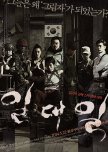"Who am I?"
Director Kim Ki Duk took the viewer to dark places with One on One. Though he highlighted how the rich get richer and the poor get poorer, the poor were shown to be just as culpable in society’s ills as those in positions of power.
After a school girl was murdered, seven vigilantes stalked the killers and the ones who ordered the hit. One by one, the murderers were captured and tortured to find out all they knew about the killing. Each time they captured someone, the vigilantes changed costumes. The group began to fracture when some of the vigilantes begin to ask, when is too much violence, too much?
The contract killers were all shown to live comfortable lives with significant others. While they ate ramen as a snack, many of the vigilantes were reduced to eating it as their main meals. Most of the vigilantes were suffering social injustices from different corners. The curious thing was that Kim Young Min not only played one of the killers, but also several different characters callously interacting with the vigilantes in their daily lives. Perhaps it meant that abusive jerks are similar regardless of their station in life?
After every prisoner was captured, they all asked, “Don’t you know who I am?” Director Kim seemed to be asking the audience to ask that question of themselves as well. “I was just following orders” or even “I was doing it for the greater good” were the common answers given during the torture sessions. How many of the world’s evils have been built on those two concepts? What danger could a school girl be to society that she was brutally murdered?
The film was shot in two weeks and it looked flat and gray at times. The sound could be abysmally bad. Having seen Kim's 3-Iron which had almost no dialogue, the heavy-handed and stilted dialogue in this film was a disappointment. For those who would be bothered, there was a long sexual encounter that started with violence. Each “victim's” torture session was different, some of the methods were more gruesome than others. There were annoying lapses in logic on several occasions. Why would the school girl keep running down dark, empty alleys when there was a well-lit street with shops to dart into? Why didn’t the vigilantes have any security around their building? Despite their dangerous activities, they didn’t even lock the doors to their hideout. They were constantly followed and observed through windows yet never knew it.
Director Kim had plenty to say about human nature and its depravity. Good guys did bad things. A few of the bad guys regretted their actions. People were cruel and driven to be greedily selfish at all social levels. The utter lack of compassion for their fellow human beings went from the top to the bottom of the economic structure. Kim asked the question, “Who am I?” Perhaps more importantly, “What am I?" One on One was frustratingly inconclusive regarding answers and had an overtly pessimistic view of humanity.
11 July 2024
After a school girl was murdered, seven vigilantes stalked the killers and the ones who ordered the hit. One by one, the murderers were captured and tortured to find out all they knew about the killing. Each time they captured someone, the vigilantes changed costumes. The group began to fracture when some of the vigilantes begin to ask, when is too much violence, too much?
The contract killers were all shown to live comfortable lives with significant others. While they ate ramen as a snack, many of the vigilantes were reduced to eating it as their main meals. Most of the vigilantes were suffering social injustices from different corners. The curious thing was that Kim Young Min not only played one of the killers, but also several different characters callously interacting with the vigilantes in their daily lives. Perhaps it meant that abusive jerks are similar regardless of their station in life?
After every prisoner was captured, they all asked, “Don’t you know who I am?” Director Kim seemed to be asking the audience to ask that question of themselves as well. “I was just following orders” or even “I was doing it for the greater good” were the common answers given during the torture sessions. How many of the world’s evils have been built on those two concepts? What danger could a school girl be to society that she was brutally murdered?
The film was shot in two weeks and it looked flat and gray at times. The sound could be abysmally bad. Having seen Kim's 3-Iron which had almost no dialogue, the heavy-handed and stilted dialogue in this film was a disappointment. For those who would be bothered, there was a long sexual encounter that started with violence. Each “victim's” torture session was different, some of the methods were more gruesome than others. There were annoying lapses in logic on several occasions. Why would the school girl keep running down dark, empty alleys when there was a well-lit street with shops to dart into? Why didn’t the vigilantes have any security around their building? Despite their dangerous activities, they didn’t even lock the doors to their hideout. They were constantly followed and observed through windows yet never knew it.
Director Kim had plenty to say about human nature and its depravity. Good guys did bad things. A few of the bad guys regretted their actions. People were cruel and driven to be greedily selfish at all social levels. The utter lack of compassion for their fellow human beings went from the top to the bottom of the economic structure. Kim asked the question, “Who am I?” Perhaps more importantly, “What am I?" One on One was frustratingly inconclusive regarding answers and had an overtly pessimistic view of humanity.
11 July 2024
Was this review helpful to you?

 54
54 188
188 11
11























